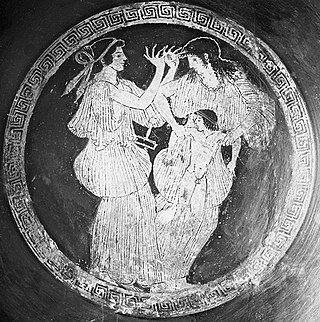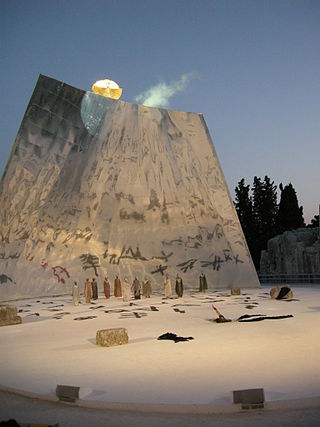
Euripides was a tragedian of classical Athens. Along with Aeschylus and Sophocles, he is one of the three ancient Greek tragedians for whom any plays have survived in full. Some ancient scholars attributed ninety-five plays to him, but the Suda says it was ninety-two at most. Of these, eighteen or nineteen have survived more or less complete. There are many fragments of most of his other plays. More of his plays have survived intact than those of Aeschylus and Sophocles together, partly because his popularity grew as theirs declined—he became, in the Hellenistic Age, a cornerstone of ancient literary education, along with Homer, Demosthenes, and Menander.

In Greek mythology, Medea is the daughter of King Aeëtes of Colchis. In the myth of Jason and the Argonauts, she aids Jason in his search for the Golden Fleece. She later marries him, but eventually kills his children and his other bride. Medea is known in most stories as a sorceress and is often depicted as a priestess of the goddess Hecate. She first appears in Hesiod's Theogony around 700 BCE, but is best known from Euripides's tragedy Medea and Apollonius of Rhodes's epic Argonautica.

Tragedy is a genre of drama based on human suffering and, mainly, the terrible or sorrowful events that befall a main character. Traditionally, the intention of tragedy is to invoke an accompanying catharsis, or a "pain [that] awakens pleasure,” for the audience. While many cultures have developed forms that provoke this paradoxical response, the term tragedy often refers to a specific tradition of drama that has played a unique and important role historically in the self-definition of Western civilization. That tradition has been multiple and discontinuous, yet the term has often been used to invoke a powerful effect of cultural identity and historical continuity—"the Greeks and the Elizabethans, in one cultural form; Hellenes and Christians, in a common activity," as Raymond Williams puts it.

Antigone is an Athenian tragedy written by Sophocles in 441 BC and first performed at the Festival of Dionysus of the same year. It is thought to be the second oldest surviving play of Sophocles, preceded by Ajax, which was written around the same period. The play is one of a triad of tragedies known as the three Theban plays, following Oedipus Rex and Oedipus at Colonus. Even though the events in Antigone occur last in the order of events depicted in the plays, Sophocles wrote Antigone first. The story expands on the Theban legend that predates it, and it picks up where Aeschylus' Seven Against Thebes ends. The play is named after the main protagonist Antigone.

Electra, also spelt Elektra, is one of the most popular mythological characters in tragedies. She is the main character in two Greek tragedies, Electra by Sophocles and Electra by Euripides. She is also the central figure in plays by Aeschylus, Alfieri, Voltaire, Hofmannsthal, and Eugene O'Neill. She is a vengeful soul in The Libation Bearers, the second play of Aeschylus' Oresteia trilogy. She plans out an attack with her brother to kill their mother, Clytemnestra.

In Greek mythology, Itys is a minor mythological character, the son of Tereus, a king of Thrace, by his Athenian wife Procne. Itys was murdered by his own mother and served to be consumed during dinner by his father, as part of a revenge plan against Tereus over him assaulting and raping Philomela, Procne's sister. His immediate family were all transformed into birds afterwards, and in some versions Itys too joins them in the avian kingdom. Itys' story survives in several accounts, the most extensive and famous among them being Ovid's Metamorphoses. His myth had been known since at least the sixth century BC.

Deus ex machina is a plot device whereby a seemingly unsolvable problem in a story is suddenly or abruptly resolved by an unexpected and unlikely occurrence. Its function is generally to resolve an otherwise irresolvable plot situation, to surprise the audience, to bring the tale to a happy ending or act as a comedic device.
Medea is an ancient Greek tragedy written by Euripides. It is based upon the myth of Jason and Medea and was first produced in 431 BC as part of a trilogy; the two other plays have not survived. The plot centers on the actions of Medea, a former princess of the kingdom of Colchis, and the wife of Jason; she finds her position in the Greek world threatened as Jason leaves her for a Greek princess of Corinth. Medea takes vengeance on Jason by murdering his new wife as well as her own two sons, after which she escapes to Athens to start a new life.

Electra,Elektra, or The Electra is a Greek tragedy by Sophocles. Its date is not known, but various stylistic similarities with the Philoctetes and the Oedipus at Colonus lead scholars to suppose that it was written towards the end of Sophocles' career. Jebb dates it between 420 BC and 414 BC.

Philip Humphrey Vellacott was an English classical scholar, known for his numerous translations of Greek tragedy.
David Grene was an Irish American professor of classics at the University of Chicago from 1937 until his death. He was a co-founder of the Committee on Social Thought and is best known for his translations of ancient Greek literature.
Rush Rehm is professor of drama and classics at Stanford University in California, in the United States. He also works professionally as an actor and director. He has published many works on classical theatre. Rehm is the artistic director of Stanford Repertory Theater (SRT), a professional theater company that presents a dramatic festival based on a major playwright each summer. SRT's 2016 summer festival, Theater Takes a Stand, celebrates the struggle for workers' rights. A political activist, Rehm has been involved in Central American and Cuban solidarity, supporting East Timorese resistance to the Indonesian invasion and occupation, the ongoing struggle for Palestinian rights, and the fight against US militarism. In 2014, he was awarded Stanford's Lloyd W. Dinkelspiel Award for Outstanding Service to Undergraduate Education.
Patricia Elizabeth Easterling, FBA is an English classical scholar, recognised as a particular expert on the work of Sophocles. She was Regius Professor of Greek at the University of Cambridge from 1994 to 2001. She was the 36th person and the first — and, so far, only — woman to hold the post.
Edith Hall, is a British scholar of classics, specialising in ancient Greek literature and cultural history, and professor in the Department of Classics and Ancient History at Durham University. She is a Fellow of the British Academy. From 2006 until 2011 she held a Chair at Royal Holloway, University of London, where she founded and directed the Centre for the Reception of Greece and Rome until November 2011. She resigned over a dispute regarding funding for classics after leading a public campaign, which was successful, to prevent cuts to or the closure of the Royal Holloway Classics department. Until 2022, she was a professor at the Department of Classics at King's College London. She also co-founded and is Consultant Director of the Archive of Performances of Greek and Roman Drama at Oxford University, Chair of the Gilbert Murray Trust, and Judge on the Stephen Spender Prize for poetry translation. Her prizewinning doctoral thesis was awarded at Oxford. In 2012 she was awarded a Humboldt Research Prize to study ancient Greek theatre in the Black Sea, and in 2014 she was elected to the Academy of Europe. She lives in Cambridgeshire.
Peter Meineck is Professor of Classics in the Modern World at New York University. He is also the founder and humanities program director of Aquila Theatre and has held appointments at Princeton University and University of South Carolina.
The representation of women in Athenian tragedy was performed exclusively by men and it is likely that it was performed solely for men as well. The question whether or not women were admitted at theatre is widely contested and tends to polarise fronts. Even though Henderson excludes women from all public poetry: “drama, like all public poetry in the classical period, was written, produced and performed only by men, and the dramatic festivals were organized and controlled by the demos, the sovereign corporation of adult male citizens”, he does not rule out female spectators.
Ian C. Johnston is a Canadian author and translator, a retired university-college instructor and a professor emeritus at Vancouver Island University.
Tragic themes are ever-present in the world of ancient epic. Ancient tragedians often focused on ideas such as mythology, love, passion and violence in their works and these are clearly reflected in epic, especially in Ovid's Metamorphoses. Tragic themes do not simply refer to subject matter however and can also be used in reference to the format of the writing, such as utilizing dramatic monologues, or soliloquies, metatheatre, and emphasizing time and place.

Nancy Sorkin Rabinowitz is a classical scholar, specialising in ancient Greek literature and intersectional feminism.
Fiona Macintosh is Professor of Classical Reception at the University of Oxford, Director of the Archive of Performances of Greek and Roman Drama, Curator of the Ioannou Centre, and a Fellow of St Hilda's College, Oxford.












